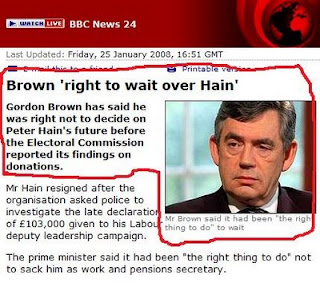Sometimes I read a report and wonder why it is there. Nothing existential, just the non-sensical logic behind it. This morning the BBC headline runs ” Bush ‘is avoiding Iraq decisions'”- top billing for this story.
Let’s leave alone the fact that this headline immediately promotes a subjective, politicised point. Let’s question its very newsworthiness. Why is it there? Perhaps, I thought, because yesterday Bush was hailing Iraq progress and (as the BBC put it) freezing any “pull out” from Iraq. That’s newsworthy, really.
Yet what about today’s headline? Ah, well that’s the Democrat response. We’ve moved from reporting a decision arising from concrete events to the political strategy of one US party. Not cricket, BBC.
You can often tell the BBC position because they reiterate a certain rhetorical line in an article, underlining a particular soundbyte.
In this case, we first of all get the warm-up line from the Beeb, “But his opponents say the people want answers from this president, now.” (which certainly has a rhetorical ring to it inappropriate to a factual news item), and then the main event from Nancy Pelosi:
“”The president has taken us into a failed war, he’s taken us deeply into debt and that debt is taking us into recession,” she said. “We need some answers from the president.””
It’s like the run-up before the penalty kick.
What’s really funny though is the fact that the BBC headlines a story Bush “avoiding Iraq decisions”, when in fact he has just decided something- which was yesterday’s news. Today’s news is that he’s declined to follow-through with a decision that the Democrats wanted and want to intensify and speed up. This is rather more nuanced and requires the BBC’s special news skills (arising from its unique funding) to bring to our attention.


